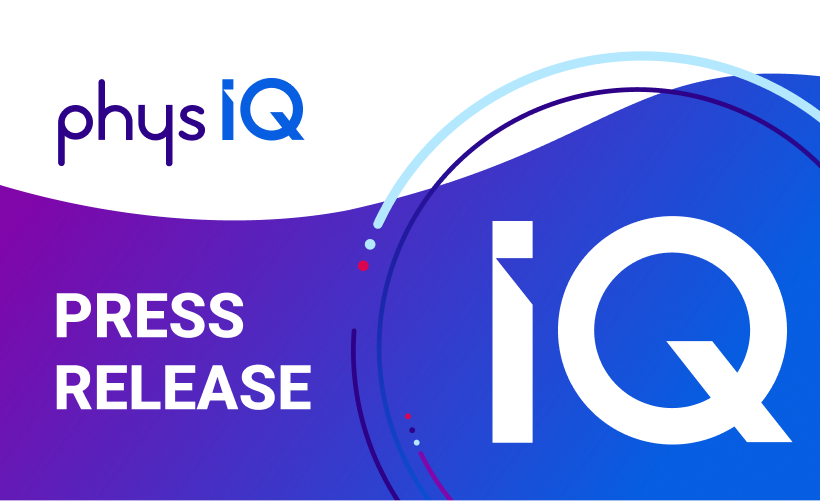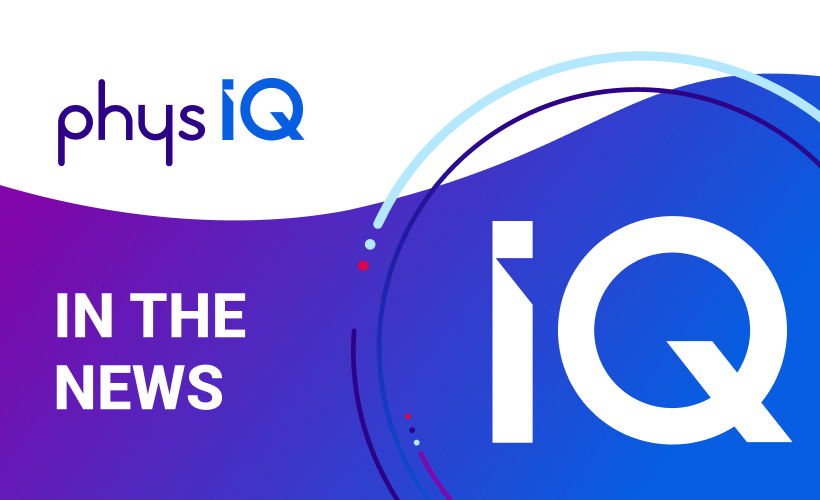Inside an Individual’s Physiological Signature
Originally published in Medical Device & Technology
3 min read
![]() physIQ
:
July 10, 2018
physIQ
:
July 10, 2018

THE HAGUE, Netherlands & CHICAGO – (BUSINESS WIRE) – Haga Teaching Hospital, physIQ, and VitalConnect announced today that cancer patients are being enrolled and monitored in a study that is evaluating how wearable biosensors and artificial intelligence-based analytics can augment clinical care for patients in treatment. The study is being funded by Janssen Pharmaceuticals (a Johnson & Johnson Company). In the investigator-initiated study, patients being treated with either erythrocyte transfusion or chemotherapy, either with or without immunotherapy, are provided VitalPatch® biosensors that collect and stream physiological data via physIQ’s pinpointIQTM platform. The goal of the study is to evaluate how continuous physiological data coupled with sophisticated personalized analytics can provide early clinical indication of adverse events sometimes associated with anti-cancer treatment
“Immunotherapy and other anti-cancer treatments offer great hope for patients managing hematological diseases” said Dr. Martin Schipperus, Chair of Hematology at Haga Teaching Hospital. “However, these same powerful agents can also result in side effects that may impact patients’ ability to tolerate treatment. By monitoring patients this way, we hope to identify a novel approach to proactively identifying and managing adverse events that may otherwise negatively impact patient outcomes.”
Through the physIQ pinpointIQ solution, clinical-grade vital signs stream continuously, 24/7, from the VitalPatch biosensor to the cloud. Patients begin wearing the biosensor several days prior to the treatment to allow the physIQ artificial intelligence-based analytics to develop a pre-treatment personalized baseline. Patients then continue to wear the VitalPatch, both during and after treatment in the clinic. By comparing each patient to their own personalized baseline, clinicians are able to continuously monitor their physiological response throughout treatment and afterwards, even when the patients have returned home.
“Artificial intelligence-based analytics and wearable biosensors hold great promise for monitoring at-risk patient populations at home, at work, in the clinic, and all places in between” said Dr. Stephen Ondra, Chief Medical Officer of physIQ. “The oncology space is one that has enormous unmet need with respect to how we deliver care and support patients as they undergo and manage these potentially life-saving therapies. Too often, patients must discontinue therapy because of adverse events that could be avoided or minimized through early detection. We are excited by the prospect of evolving the standard of care to use personalized proactive information to improve outcomes.”
The pinpointIQ solution, its personalized analytics, and the VitalPatch biosensor are being deployed in various clinical environments to support clinicians caring for at-risk patient populations. The end-to-end solution is also being provided to pharmaceutical and medical device companies that are integrating real-world data sets into clinical trials. With 14.1 million new cases annually worldwide1, cancer is associated with some of the most pressing unmet needs in healthcare. “Every year we see better treatments available in oncology which is very encouraging,” added Schipperus, “but beyond drugs alone there is need to improve the patient experience and we are excited about the innovations now available to potentially improve how these patients are cared for.”
About HagaZiekenhuis
The Haga Teaching Hospital in The Hague with Juliana Children's Hospital is since 2013 part of the Reinier Haga Group. A merger between Haga Teaching Hospital (city of The Hague), Reinier de Graaf (city of Delft) and LangeLand Hospital (city of Zoetermeer). We have selected with our medical staff several themes in patient groups which includes cardiovascular care and oncology. We opt for an integrated approach. This includes both patient-driven outcomes and diagnosis of specific processes, care paths, efficiency, innovation cycles and in the nearby future cost analyzes.
About VitalConnect, Inc.
VitalConnect is a leader in wearable biosensor technology for wireless patient monitoring in both hospital and remote patient populations. VitalConnect leverages extensive expertise in biomedical engineering, data analytics, chip design, and mobile and cloud software to create technology that supports decision-making paradigms that achieve better health and economic outcomes. VitalConnect’s products are designed for use in a broad range of inpatient and outpatient settings, such as hospital monitoring, post discharge care, cardiac monitoring and pharmaceutical solutions. For more information: www.vitalconnect.com
About physIQ, Inc.
PhysIQ is a company dedicated to enabling proactive care delivery models through pinpointIQ™, our highly scalable cloud-based platform for personalized physiology analytics. Our FDA 510k-cleared data analytics platform is designed to process multiple vital signs from wearable sensors to create a personalized dynamic baseline for each individual. By mapping vital sign relationships this way, physIQ’s analytics detect subtle deviations that may be a precursor to disease exacerbation or change in health. With applications in both healthcare and clinical trial support, physIQ is transforming continuous physiological data into insight for providers, health systems, payers, and pharmaceutical and medical device companies. For more information, please visit www.physiq.com. Follow us on Twitter and LinkedIn.

Originally published in Medical Device & Technology

Originally published in Pixel Scientia Labs

Originally published in Crain's Chicago